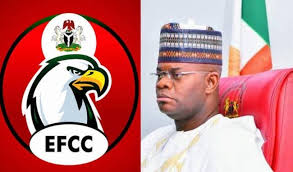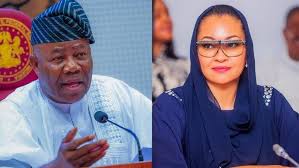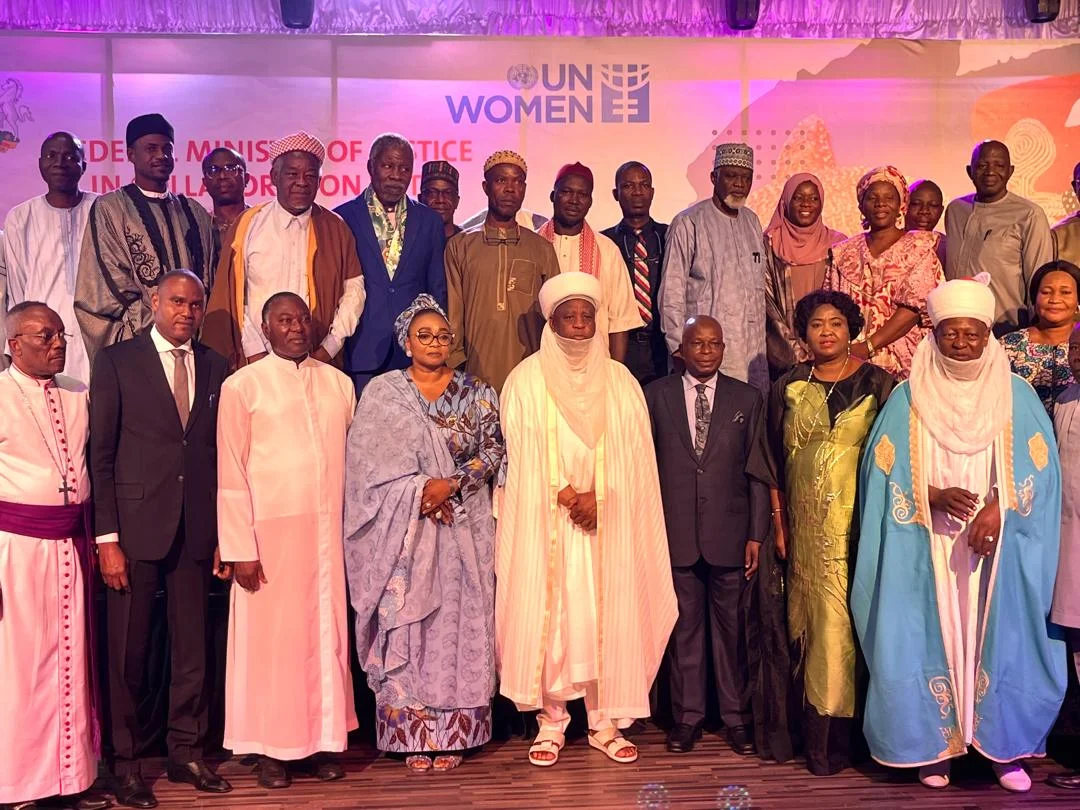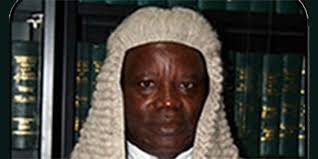Court to rule in Yahaya Bello’s application to travel abroad for medicals
By Edith Nwapi
Justice Maryann Anenih of an Abuja High Court on Tuesday, adjourned ruling in an application filed by former Governor of Kogi, Yahaya Bello, seeking leave to travel abroad for medical reasons.
Bello and his co-defendants Umar Oricha and Abdulsalami Hudu were arraigned on Nov 27, 2024, on a 16-count-charge bordering on alleged property fraud to the tune of N110 billion.
Anenih adjourned until July 17 after listening to Bello’ s application to travel to the United Kingdom (UK) for medical reasons.
Earlier, Joseph Daudu, SAN, counsel to Bello, told the court that he filed an application, dated June 19, and filed on June 20.
“It seeks an order for the release of the 1st defendant/applicant’s international passport by the registrar to enable him to travel for medical attention,” he said.
He said the application was supported by an affidavit of 13 grounds in the face of the motion and supported by a 22-paragraph affidavit deposed to by the applicant himself.
The EFCC had filed a counter-affidavit, saying granting the request could delay further proceedings.
Daudu, in response to the prosecution’s counter-affidavit, said the defendant had also filed a further affidavit of 20 paragraphs, on July 7, 2025, and deposed to by the applicant himself with two exhibits.
“Exhibits C is the CTC of the ruling of your lordship, admitting the defendant to bail, and Exhibit D is the ruling of FHC admitting him to bail.
“We adopt these documents in urging your lordship to grant our application,” he stated.
Responding to the prosecution’s argument that the application was an abuse of court process in the sense that a similar application was filed at FHC, he argued that it could not be an abuse of court process.
He hinged his argument on the fact that it was the complainant that instituted both charges in the separate courts.
“It will be a futile exercise to apply in one court and not to apply in the other court,” Daudu, submitted.
The prosecution counsel, Chukwudi Enebeli, SAN, while defending the EFCC’s counter-affidavit, said the defendant should have put his sureties on notice with regard to his application to travel out of the country.
According to him, the sureties need to decide whether they would want to continue to stand as sureties for him when he travels.
He added that, by filing the same application at both the FCT High Court and Federal High Court, the defendant’s counsels were setting the courts on a collision course.
“If FHC refuses that application and my lord grants it, it will make mockery of our judicial system,” Enebeli argued.
Enebeli also mentioned that the applicant is on the “red letter alert “and maybe held abroad.
Responding, Daudu said, on the issue of suretyship, the sureties were already aware.
“We need not put them on notice,” he said.
“Finally, on the interpol matter, it is a dead argument.
“He has never flouted your lordship’s order. They themselves have even forgotten about those red alerts,” the lawyer added, urging the court to grant the application.
After listening to both parties, Justice Anenih adjourned until July 17, 2025 for ruling. (NAN)(www.nannews.ng)
Edited by Sadiya Hamza
JAMB: Police arraign 2 for alleged exam malpractice in Katsina
By Zubairu Idris
The Police have arraigned two persons before the Federal High Court in Katsina for alleged impersonation and examination malpractice.
The police prosecutor, Abdussalam Danmaidaki, said the defendants, Bolanwu Emmanuel and Ibrahim Abdulaziz, committed the offence on April 30, at Zee Alpha International School, Funtua.
Danmaidaki said that Emmanuel invited Abdulaziz into the exam hall to impersonate him and sit for the 2025 UTME, JAMB examination on his behalf with registration number: 2025515278JA.
The prosecutor said that the offence was punishable under sections 4(2)(a) and (b), and 4(3)(c) of the exam malpractice, Act, Cap E15, laws of the Federation of Nigeria, 2004.
He also said that Abdulaziz, unlawfully and fraudulently presented himself as UTME candidate and wrote the said exam in the same name of Emmanuel with registration number: 2025515278JA.
He said that the offence was punishable under sections 3(1)(a) and (b), and 3(2)(c) of the exam malpractice Act, Cap E15 laws of the Federation of Nigeria, 2004.
The defendants however, pleaded not guilty.
The prosecutor prayed the court to allow time for him to present witnesses.
The presiding judge, Justice Hussaini Dadan-Garba, adjourned the case to July 18, for trial and presentation of witnesses by the prosecution. (NAN)(www nannews.ng)
Edited by Maureen Ojinaka and Yakubu Uba
Alleged N400m fraud: AGF gives I-G go-ahead to prosecute Andy Uba, 1 other
Fraud Prosecution Authorized Against Senator Andy Uba
The Attorney-General of the Federation (AGF) has granted the Inspector-General of Police (I-G) permission to prosecute former Senator Andy Uba over alleged fraud involving N400 million.
The charges accuse Uba, alongside co-defendants Benjamin Etu and Hajiya Fatima (currently at large), of conspiring in 2022 to defraud Mr George Uboh by falsely promising to secure the Niger Delta Development Commission (NDDC) Managing Director position for anyone who could pay N400 million.
Originally, Crystal Uba was also charged but was later dropped after the Department of Public Prosecutions (DPP) found no evidence linking her to the offense.
The amended two-count charge, filed in March 2025, is based on evidence including documentary proof and voice recordings submitted by Uboh.
The case, under Federal High Court charge number FHC/ABJ/CR/538/2024, was reassigned to Justice Mohammed Umar following the suspension of the former judge. The defendants are scheduled to enter their plea on September 24, 2025.
While Uba’s defense claims the matter has been settled with payment, the prosecution insists on proceeding after the AGF’s review confirmed a prima facie case.
Uba is currently abroad on medical grounds, according to his lawyer, though the prosecution has challenged the lack of documentary proof for this claim.
Edited by Sadiya Hamza
Senate yet to receive CTC on Akpoti-Uduaghan’s court judgment – Adaramodu
The Senate on Sunday acknowledged the court judgment on Sen. Natasha Akpoti-Uduaghan, saying, however, that it was yet to receive the Certified True Copy (CTC) of the judgment.
The Chairman, Senate Committee on Media and Public Affairs, Sen. Yemi Adaramodu, said this in a statement in Abuja.
He said that the CTC of the judgment was necessary for a thorough review and informed determination of the next course of action.
He stated that pending receipt of the CTC, the senate would refrain from taking any step that might prejudice its legal position regarding Akpoti-Uduaghan’s suspension.
“The senate of the Federal Republic of Nigeria acknowledges that judgment was delivered on July 4th by the Federal High Court, Abuja, in the suit instituted by Sen. Natasha Akpoti-Uduaghan.
“However, the senate is yet to be served with the certified true copy (CTC) of the said judgment.
“Our legal representatives, who were in attendance at the proceedings, have confirmed that the complete judgment was not read in open court.
“Consequently, we have formally applied for the CTC to enable a thorough review and informed determination of the appropriate legal response, particularly in view of the uncertainty surrounding whether the court made any direct order nullifying the suspension of Sen. Akpoti-Uduaghan.
“Since no party to the case has been officially served the enrolled order of the judgement, none can enforce any perceived order or relief.
“Pending receipt and examination of the CTC, and acting on the advice of counsel, the senate shall refrain from taking any step that may prejudice its legal position,” he said.
Adaramodu expressed the senate’s commitment to upholding the rule of law, stressing that it would act strictly in accordance with the provisions of the Constitution of the Federal Republic of Nigeria upon full clarification of the court’s pronouncements.
While urging the public to remain patient, he assured of senate’s fidelity to due process, as it awaits CTC of the court ruling to determine the next course of action. (NAN)(www.nannews.ng)
Edited by ‘Wale Sadeeq
Accept your spouse’s judgements, Nwifuru to relatives of judges
By Chukwuemeka Opara
Gov. Francis Nwifuru of Ebonyi has advised spouses, especially those serving in critical profession such as judges, to always accept official decisions by their partners.
Nwifuru gave the advice while swearing-in a new judge of the state customary court of appeal, Justice Linda Ogodo in Abakaliki.
The governor said that for Nigeria’s justice system to be respected, those in the temple of justice must be firm in their decisions.
Nwifuru also advised relatives and friends of judges to avoid interference in their professional duties, saying that rule of law and quality justice delivery are essential for the development of any nation.
“The world over, rule of law is a critical factor for investors, while taking business decisions and that is why we are hammering on factors that adversely affect it,” he said.
Nwifuru, however, told the husband of the new judge who is a solicitor in the state to accept judgments from his wife especially when such are not in his favour.
The governor who described Ogodo’s husband as a `tough’ solicitor, urged him to realise that his wife’s level has changed.
“I believe in professionalism and decency which have distinguished Ebonyi judges from their peers.
“Your husband should realise that his wife is now a judge and her judicial decisions and pronouncements shall now attract more public attention and scrutiny.
“Women value their professional respect very much and Justice Ogodo has been outstanding before now,” he said.
He noted that judges in the state have succeeded because their spouses offer them opportunities to perform their duties well.
“An example was in 2017 when a female judge whose husband was a government appointee did not allow family sentiments determine the outcome of our matter against the then House of Assembly speaker.
“The new judge’s husband should, therefore, accept any unfavourable judgment from her because others in such shoes, felt the same way,” he said.
Nwifuru congratulated the judge on her elevation and urged her not to disappoint the state including those who repose confidence in her.
“You should not take the position of your husband in matters but that of the law.
“The state chief judge can confirm that I do not have interest in matters before our courts.
“No government official should, therefore, have interest in any matter when I do not have,” he said.
Ogodo, in her response, thanked the governor and all those who contributed immensely to making the occasion successful. (NAN)(www.nannews.ng)
Edited by Francis Onyeukwu
Sultan, CAN pledge joint action on GBV prevention, survivor justice
By Justina Auta
The Sultan of Sokoto and President-General of the Nigeria Supreme Council for Islamic Affairs (NSCIA), Alhaji Sa’ad Abubakar, and the Christian Association of Nigeria (CAN) have reaffirmed their commitment to ending Gender-Based Violence (GBV) in Nigeria.
Their stance was emphasised during a capacity-building session for faith-based organisations on GBV, jointly organised by the Federal Ministry of Justice and UN Women, with support from the Ford Foundation on Friday in Abuja.
The Sultan stated, “Our personal presence here shows that we are very much aware of this, we are very committed, and we are deeply concerned about this violence being meted out to our people.
“It is high time we come out fully to tackle this monster, this scourge that has been inflicted on us by us, because human beings are the ones doing this.”
He highlighted the importance of promoting girl-child education and upholding family values, calling it both a religious obligation and a national imperative.
“Educating the girl-child will give them the strength and knowledge to defend themselves, avoid dangers, and take action against intruders,” he added.
The Sultan also acknowledged that GBV affected men and stressed the importance of unity, urging faith communities to collaborate across religious lines and with government institutions to eradicate GBV.
Also, Rev. Fr. Anselm Olorunfemi-Ologunwa, Chairman of CAN, Ondo State, described GBV as a gross violation of human rights, dignity, and human worth.
He called on spiritual leaders to play a proactive role in preventing GBV and ensuring access to justice for survivors.
“We must work together to address the root causes of GBV, including harmful traditional practices, gender inequality, and lack of access to education and economic opportunities,” he said.
He also urged faith leaders to support survivors, promote a culture of dignity, and advocate for policy changes that would protect the rights of women and girls.
Attorney General of the Federation, Lateef Fagbemi, urged faith-based leaders to encourage survivors to speak out, refer cases to law enforcement, and help build community-led prevention and rehabilitation systems.
He also proposed the establishment of safe spaces in churches and mosques.
“The formal justice system cannot succeed without your partnership.
“The law cannot walk alone, it needs feet in the community. Those feet are yours,” Fagbemi said.
Minister of Women Affairs, Hajiya Imaan Sulaiman-Ibrahim, emphasised the role of religious institutions in protecting the vulnerable.
She urged faith communities to take an active stance in creating safe and supportive environments for all.
“Let this session ignite conviction and let our places of worship and religious platforms become citadels of protection and moral clarity.
“No faith condones abuse, no scripture justifies violence, and no tradition must override human dignity,” she said.
Mrs Beatrice Eyong, UN Women Representative to Nigeria and ECOWAS, represented by Deputy Country Representative Mrs Patience Ekeoba, added: “We are here to support, to learn, and to act together.
“Ending GBV is not only a moral imperative but also a shared responsibility and a pathway to peace and prosperity.” (NAN)(www.nannews.ng)
Edited by Abiemwense Moru
Ojukwu emerges president of West Africa human rights group
By Edith Nwapi
The Executive Secretary of National Human Rights Commission (NHRC), Dr Tony Ojukwu, SAN, has been elected as the President of the National Human Rights Institutions (NHRIs) Network.
The network comprises countries under ECOWAS region which are: Benin, Cape Verde, Cote D’Ivoire, Gambia, Ghana, Guinea-Bissau, Liberia, Mali, Nigeria, Senegal, Sierra Leone and Togo.
The 3-day regional consultation of ECOWAS sub-region held in Abuja with the theme, `Justice for Africans and People of African Descent through Reparations: The Role of National Human Rights Institutions.”
Ojukwu pulled eight votes out of 12 votes to be elected for a term of two years.
He took over from Dr Joeseph Withall, the out-going president of the network and chair of Network for African National Human Rights Institutions (NANHRI).
The Regional Consultation was organised by the NNHRI-WA under the auspices of the National Human Rights Commission of Nigeria, in partnership with the Economic Community of West African States (ECOWAS Commission).
Co-organisers of the event are Office of the United Nations High Commissioner for Human Rights in West Africa (OHCHR-WARO) and the United Nations Office for West Africa and the Sahel (UNOWAS).
In his acceptance speech, Ojukwu thanked all the participants and partners for their support in the quest to promote and protect human rights of all citizens.
Ojukwu noted that the regional consultation was aimed at enhancing the overall roles of NHRIs toward the promotion and protection of human rights in West Africa.
“The year 2025 is a unique moment for human rights and the NHRC in Nigeria as we celebrate our 30 years of existence.
“For ECOWAS, we celebrate 50 years of regional integration and for the United Nations, we mark 80 years of the signing of the UN Charter.
“It is my hope that these milestones become impactful for the advancement of human rights in our sub-region,’’ he said.
Ojukwu said that his vision for this network was anchored on the following: mutual respect and cooperation for the promotion and protection of human rights in West Africa.
“Building of the capacity of NHRIs to be able to meet the ever-growing challenges of resourcing, governance and operations of NHRIs.
“Support sub-regional monitoring, documentation and reporting of human rights in West Africa by setting up a sub-regional Situation Room and Data Centre.
“Strengthening collaborations with our sub-regional political and judicial institutions, the ECOWAS Commission, the ECOWAS Community Court of Justice as well as the ECOWAS Parliament and others,” he said.
Ojukwu added that consolidating and opening new grounds with their development partners, UN, international and national NGOs, academic and media institutions were paramount.
He noted that with the changing nature of international development aid and the challenges of the international rule-based system, it seems this vision was already daunting.
Ojukwu added that it was challenging but with the support of each member, it would be surmounted and the network would grow from strength to strength.
The News Agency of Nigeria (NAN) reports that representatives of NHRIs from 12 countries in the West African sub-region, ECOWAS Commission, OHCHR-WARO and UNOWAS took part in the event.
They addressed wide range of issues through experience sharing, exchanging best practices and strengthening regional cooperation for effective implementation of strategies toward the realisation of the theme of the consultation.
A communiqué is expected at the end of the event which would guide their actions for the next two years. (NAN)(www.nannews.ng)
Edited by Dorcas Jonah/Francis Onyeukwu
Court orders Natasha’s recall, fines her N5m for contempt
By Taiye Agbaje
The Federal High Court in Abuja, on Friday, ordered the Senate to recall Sen. Natasha Akpoti-Uduaghan representing Kogi Central Senatorial District, back for her legislative duties, describing her six-month suspension as “excessive.”
Justice Binta Nyako, in a judgment, also awarded a fine of N5 million against Akpoti-Uduaghan for her “Satirical Apology” message which she posted on her Facebook page on April 27 in disobedience of the valid order of the court.
Justice Nyako, therefore, ordered Akpoti-Uduaghan to tender an unreserved apology in two national dailies and on her Facebook page within seven days of the order before she can purge herself of the contemptuous act against the court.
The News Agency of Nigeria (NAN) reports that the lawmaker had, in a suit marked: FHC/ABJ/CS/384/2025 and filed on March 3, dragged the clerk of the National Assembly and the Senate; the Senate President, Godswill Akpabio to court.
Equally joined in the suit seeking court order to stop them from sanctioning her over her alleged misconduct was the Chairman, Senate Committee on Ethics, Public Petitions and Privileges, Sen. Neda Imasuen. (NAN)(www.nannews.ng)
Edited by Francis Onyeukwu
CJN appoints Babatunde Adejumo as NJI administrator
By Ebere Agozie
The Chief Justice of Nigeria (CJN), Justice Kudirat Kekere-Ekun, has approved the appointment of Justice Babatunde Adeniran Adejumo as the Administrator of the National Judicial Institute (NJI).
Mr Tobi Soniyi, Senior Special Assistant on Media to the CJN disclosed this in a statement on Thursday in Abuja.
He said that the appointment of Adejumo, a former President of the National Industrial Court of Nigeria will take effect from August 1, 2025.
He noted that Adejumo’s experience and deep understanding of judicial administration are qualities that are expected to enhance the institute’s effort in promoting judicial capacity development and institutional innovation.
He said that the action of the CJN followed the endorsement of Adejumo by the Board of Governors of the institute which is under her chairmanship.
Adejumo succeeds Justice Salisu Garba Abdullahi whose tenure as administrator will conclude on July 31, 2025, after four years of meritorious service.
“The CJN expresses appreciation to the outgoing administrator for his tireless commitment and invaluable contributions to the growth and development of the institute and the Nigerian judiciary as a whole’’.
Justice Babatunde Adejumo, a respected jurist and a seasoned administrator served as President of the National Industrial Court of Nigeria until his retirement in 2019.
The National Judicial Institute is the apex institution responsible for the continuing education, training and development of judicial officers and their support staff across all levels of the judiciary.
It serves as a centre for excellence in judicial studies, with a mandate to promote efficiency, uniformity and improvement in the quality of judicial services nationwide.
The institute routinely conducts courses, workshops, conferences and other academic and professional programmes tailored to enhance the knowledge, performance, and ethical standards of judicial officers and personnel in line with global practices. (NAN)(www.nannews.ng)
Edited by Sadiya Hamza












